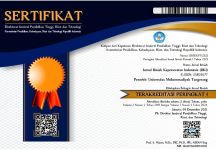The Description of Infectious Waste Management by Nurses Stationed at Inpatient Room of Arifin Achmad General Hospital of Riau Province
Abstract
Hospital activities produce various kinds of hospital waste, one of which is infectious waste. Infectious waste management that is not good can cause health and environmental problems. This study aims to see an overview of infectious waste management by nurses in class III inpatient rooms (Dahlia, Edelweis, Kenanga, Krisan) Arifin Achmad Regional General Hospital, Riau Province. This study uses a simple descriptive design with the number of respondents 66 nurses using a total sampling technique. The data collection method in this study used a questionnaire. The analysis used is univariate analysis. The results of this study explained that as many as 48 nurses carried out infectious waste management well (72.7%). a total of 50 nurses have good knowledge of waste management (75.8%). The type of infectious waste in the treatment room is the majority of waste contaminated with patients in the isolation ward such as gauze, swab bandages, and other contaminated waste. a total of 50 nurses performed the waste sorting method well (75.8%) and 51 nurses performed the waste collection method well (77.3%). Overall, the nurses in the ward have performed the infectious waste management well. This research is expected so that nurses can further improve the quality of waste management in the inpatient room so that it will be even better in the future.
Keywords: Infectious waste; Waste management;Nurses
Full Text:
ARUM_PDFReferences
Amelia, A. R., Ismayanti, A., Rusydi, A. R. (2020). Pengelolaan limbah medis padat di Rumah Sakit Umum Daerah Mamuju Provinsi Sulawesi Barat. Window of Health: Jurnal Kesehatan. Vol 3 (1). Hal 79.
Anozie, O. B., Lawani, L. O., Eze, J. N., Mamah, E. J., Onoh, R. C., Ogah, E. O., … Anozie, R. O. (2017). Knowledge, attitude and practice of healthcare managers to medical waste management and occupational safety practices : findings from Southeast Nigeria. Journal of Clinical and Diagnostic Research, 11(3), 1. https://doi.org/10.7860/JCDR/2017/24230.9527
Arif, M. I. (2013). Studi penanganan limbah padat infeksius di laboratorium Rumah Sakit Umum Daerah Haji Makassar. Jurnal MKMI. hal 230-235.
Asmarhany, C. D. (2014). Pengelolaan limbah medis padat di Rumah Sakit Umum Daerah Kelet Kabupaten Jepara. Universitas Negeri Semarang.
Asriningrum, S. (2018). Faktor-faktor yang mempengaruhi perilaku perawat dalam pemilahan limbah medis di RS Al Islam Bandung. Teras Kesehatan, 1(1), 39–54.
Awodele, O., Adewoye, A. A., & Oparah, A. C. (2016). Assessment of medical waste management in seven hospitals in Lagos , Nigeria. BMC Public Health, 1–11. https://doi.org/10.1186/s12889-016-2916-1
Bungamari, & Handayani, F. (2019). Hubungan tingkat pengetahuan dengan tindakan perawat dalam pengelolaan sampah medis di RSU Sembiring Deli Tua Tahun 2018. 1(2), 71.
Chandra, B. (2018). Pengantar kesehatan lingkungan. Jakarta: EGC.
Chartier, Y., Manuel, J., Pieper, U., Pruss, A., Rushbrook, P., Stringer, R., … Zghondi, R. (2014). Safe management of wastes from health-care activities (2nd ed.). Geneva: World health organization.
Darmadi. (2012). Infeksi nosokomial problematika dan pencegahannya. Jakarta: Salemba Medika.
Dari, S. P. (2018). Gambaran perilaku perawat dalam membuang limbah medis dan non medis di Rumah Sakit Bhayangkara TK II Medan Tahun 2017. Universitas Sumatera Utara.
Fahriyah, L., Husaini, & Fadillah, N. A. (2016). Pengetahuan dan sikap dengan perilaku perawat dalam pemilahan dan pewadahan limbah medis padat. Publikasi Kesehatan Masyarakat Indonesia, 3(3), 94–99.
Friedman, M. M. (2012). Teori dan praktik keperawatan keluarga Ed.3. Jakarta: EGC
Kementerian Kesehatan RI. (2017). Peraturan Menteri Kesehatan Republik Indonesia Nomor 27 Tahun 2017 Tentang Pedoman Pencegahan dan Pengendalian Infeksi di Fasilitas Pelayanan Kesehatan. Jakarta : Kemenkes RI. Diakses pada 1 November 2019 melalui http://hukor.kemkes.go.id/
Kementerian Kesehatan RI. (2019). Undang-undang nomor 26 tahun 2019 tentang keperawatan. Jakarta: Kemenkes RI. Diakses pada 20 Juni 2020 melalui http://www.depkes.go.id/
Notoatmodjo, S. (2010). Pendidikan dan perilaku kesehatan. Jakarta: Rhineka Cipta
Notoatmodjo, S. (2014). Promosi kesehatan dan perilaku kesehatan. Jakarta: Rhineka Cipta
Nurhidayah, I. (2015). Hubungan pengetahuan, sikap, dan ketersediaan fasilitas dengan perilaku perawat dalam membuang limbah medis padat di RS Bhakti Wira Tamtama Semarang. Universitas Negeri Semarang.
Oroei, M., Momeni, M., Palenik, C. J., Danaei, M., & Askarian, M. (2014). A qualitative study of the causes of improper segregation of infectious waste at Nemazee Hospital, Shiraz, Iran. Journal of Infection and Public Health, 7(3),193.https://doi.org/10.1016/j.jiph.2014.01.005
Padmanabhan, K. ., & Barik, D. (2018). Health Hazards of medical waste and its disposal. In Energy from Toxic Organic Waste for Heat and Power Generation (p. 101). India: Woodhead Publishing.
Putri, A.F. (2019). Pentingnya orang dewasa awal menyelesaikan tugas perkembangannya. SCHOULID: Indonesian Journal of School Counseling. Vol 3 (2). Hal 35-40.
Reknasari, N., Nurjazuli, & Raharjo, M. (2019). Hubungan pengetahuan, sikap dan praktik perawat dengan kualitas pengelolaan limbah medis padat ruang rawat inap instalasi Rajawali RSUP Dr.Kariadi. Jurnal Kesehatan Masyarakat, 7(3).
Sabarguna, B. S. (2011). Sanitasi air dan limbah pendukung keselamatan pasien rumah sakit. Jakarta: Salemba Medika.
WHO. (2015). Status of Health-Care Waste Management. Retrieved November 20, 2019, from World Health Organization website: http://www.who.int/
WHO. (2017). Safe Management of Wastes from Health Care Activities. Retrieved February 27, 2020, from World Health Organization website: http://www.who.int/
WHO. (2018). Healthcare Waste Fact Sheet. Retrieved February 27, 2020, from World Health Organization website: http://www.who.int/
Zuhriyani. (2019). Analisis sistem pengelolaan limbah medis padat berkelanjutan di Rumah Sakit Umum Raden Mattaher Jambi. Jurnal Pembangunan Berkelanjutan. Vol.1 (1)
DOI: http://dx.doi.org/10.31000/jiki.v5i1.2953
Article Metrics
Abstract - 486 ARUM_PDF - 3439DOI (ARUM_PDF): http://dx.doi.org/10.31000/jiki.v5i1.2953.g3242
Refbacks
- There are currently no refbacks.
Copyright (c) 2022 Jurnal Ilmiah Keperawatan Indonesia [JIKI]
JIKI: Jurnal Ilmiah Keperawatan Indonesia a Creative Commons Attribution-ShareAlike 4.0 International License. © View My Stats







